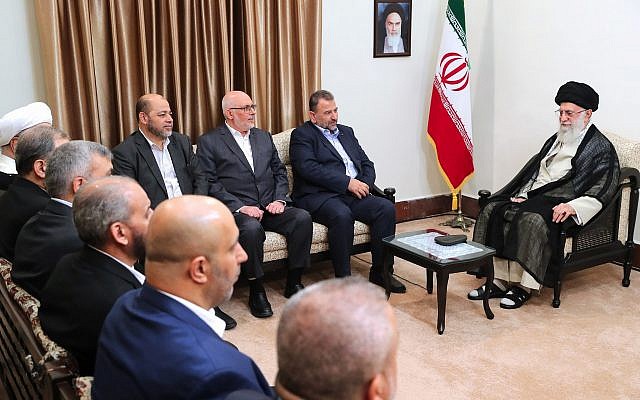FRESH AIR
Hamas and Iran Continue to Rekindle Their Relationship
August 9, 2019 | Oved Lobel

A recent visit by a high-ranking Hamas delegation to Iran seems to have borne fruit. According to Israel’s Channel 12, citing an unnamed Arab source, Iran has pledged to increase its funding of Hamas to a historic US$30 million per month, a very significant increase from current estimates despite crippling US sanctions on the Iranian regime. In exchange, the report claims, Hamas has been tasked by Iran with discovering the locations of Israeli missile storage sites.
Hamas also reportedly asked Iran to continue mediating in its attempted rapprochement with Syria, where Hamas was based until it threw its support behind the opposition to Bashar al-Assad’s regime during the civil war.
Separately, Haaretz reported that Israeli defence officials believe Hamas has agreed to open a second front against Israel in the event of a war on the northern border involving Hezbollah and Iran, and that Iran is helping Hamas develop infrastructure to destabilise the West Bank-based Palestinian Authority led by Mahmoud Abbas.
While none of this information is surprising, it serves to underline how the relationship between the Gaza-based terrorist organisation and Iran has been re-established and enhanced since at least mid-2017, when Hamas elected new leadership and apparently recanted its opposition to both Assad as well as the Houthis, the Iranian client militia in Yemen.
Multiple Hamas delegations have visited Teheran in the past two years in order to re-cement the relationship. Although reliable figures on Iranian financial aid to Hamas are difficult to come by, there’s no doubt that the support is substantial and vital to Hamas’ political and military existence, as Hamas, Israel, and Iran all regularly testify. An offer to increase funding to US$30 million per month, especially in light of Iran’s reportedly desperate economic situation, would suggest the relationship is better than it has ever been.
This new information matches recent reporting from other sources. For instance, Suheib Yousef, the son of one of Hamas’ co-founders and a former operative stationed in Turkey, told Channel 12 in July that Hamas had signals intelligence stations in Turkey it was using to spy on Israel, which it would then sell to Iran in exchange for financial aid. It’s unclear why Iran would ask Hamas to locate Israeli missile storage sites when they’re not difficult to discover online, but the pattern of trading information for aid rings true.
He also confirmed that Hamas was setting up cells to destabilise the Palestinian Authority in the West Bank, something which has also been alleged by Israel’s Shin Bet security agency in multiple reports and included an overt coup attempt in 2014. Just recently, on Aug. 8, Shin Bet announced it had foiled a Hamas cell planning to bomb Jerusalem and attack Palestinian Authority targets.
Achieving a rapprochement between Hamas and Assad has been an ongoing endeavour for Iran and its Lebanese proxy Hezbollah since 2017. Talks reportedly collapsed in June of this year, with Syria calling Hamas a terrorist organisation “with [Muslim] Brotherhood blood flowing through its veins” and a senior Hamas official subsequently saying ties would not be restored. However, it seems the attempted rapprochement with Damascus is now being pursued with renewed vigour all the same.
The idea that Hamas would help open a second front in case of war with Iran has been a guiding assumption in Israel since at least 2018, when then-Defence Minister Avigdor Lieberman stated “There are no more one-front wars…That is what we are preparing the military for.”
Recent Hamas and Iranian rhetoric certainly seems to confirm the intention for Hamas to serve as an Iranian military proxy in the event of conflict. Following the recent talks in Teheran, a senior Hamas figure, Saleh al-Arouri, said Hamas is “on the first line of defence on Iran.” Meanwhile, an Iranian diplomat announced the establishment of a united military front “from Teheran to Gaza”.
The front also goes the other way, in that Israel alleged last year in June that Hezbollah and Iran were establishing a Hamas military presence in Lebanon. What this new report alleges is not that it’s possible, or even likely, that Hamas and other Palestinian factions would open a second front in a war with Iran and Hezbollah across Syria and Lebanon, but that Iran and Hamas have arrived at a specific agreement to do so – an ominous development.
Meanwhile, the increased Iranian involvement with Hamas has apparently sparked a war of influence with Egypt, which has been negotiating multiple ceasefires with Hamas and trying to calm the situation along the security fence with Israel, where Israel and the Palestinian Authority allege that Iran funds violent elements as part of the “Great March of Return” protests. This may also have something to do with the reason Hamas reportedly replaced several top Gazan officials last week.
During the Hamas delegation’s visit, Iran’s Supreme Leader Ayatollah Ali Khamenei praised the “progress” the Palestinian factions had made, meaning that they now “possess precise rockets”. If reports of deepening Iranian involvement and increasing financial support for Hamas in Gaza and the West Bank are accurate, it can’t mean anything good for the future of either the Palestinian territories or Israel.
RELATED ARTICLES

US Middle East strategy amid regional instability: Dana Stroul at the Sydney Institute






















